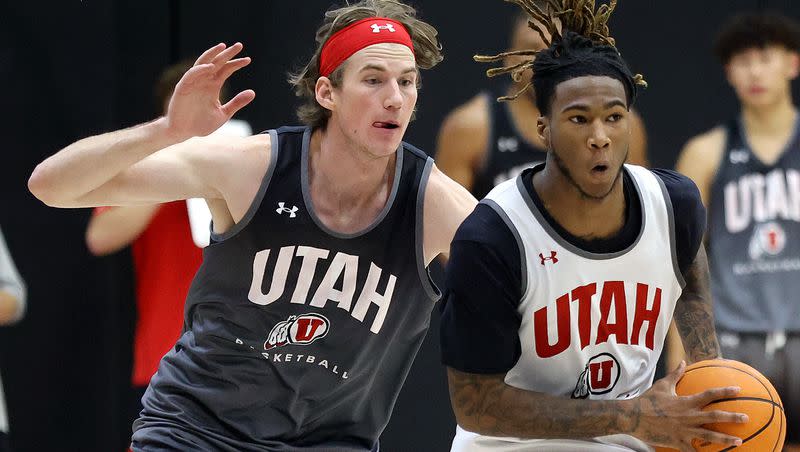Utah, Deivon Smith weighing whether he will play during 14-day temporary restraining order

- Oops!Something went wrong.Please try again later.
Utah guard Deivon Smith is among the two-time transfers who are impacted by a judge’s ruling Wednesday that granted them immediate temporary eligibility.
A twist came Thursday, however, when the NCAA released a Q&A statement that clarified the redshirt eligibility rule still applies in this scenario.
That means if any impacted player were to play over the next two weeks and the ruling is reversed, those games would count toward their eligibility.
Will Smith ultimately choose to play right now, with the potential risk of exhausting a year of eligibility for playing during a short time frame?
“We’re going to take our time, like we have been doing for the last 30 hours, trying to accumulate as much information as we can, and then try to make the best decision possible for him,” Utah men’s basketball Craig Smith told reporters Thursday.
“It’s his decision, right? It’s his career, but we’re going to talk this thing out with him, his family and then go from there.”
On Wednesday, U.S. District Judge John Preston Bailey in northern West Virginia issued a temporary restraining order (TRO) prohibiting the NCAA from enforcing its transfer rule. The ruling comes in response to a lawsuit filed by seven states, among them West Virginia, alleging the NCAA’s waiver process violates federal antitrust law.
The NCAA said in a statement it would comply with the order and notify schools, according to The Associated Press, which would allow two-time transfers working through the waiver process, like Smith, to play immediately.
A preliminary injunction hearing on the restraining order is scheduled for Dec. 27, hence the two-week conundrum. The risk is losing a redshirt season if either the ruling is reversed or the waiver process doesn’t work out for Deivon Smith.
Craig Smith didn’t specifically say whether the Utes were planning on playing Deivon Smith during the 14-day TRO before Thursday’s curveball but hinted at the possibility.
“There’s a lot, there’s a lot to talk about. There’s a lot to think about,” Craig Smith said.
“Deivon has been so professional — earlier today and last night, this morning. It can’t be easy. Even in film where there’s a good chance he’s going to be playing, then you hear this right before practice and you talk to him after. It’s a hard thing. Just talking to him now, though, oh my goodness, just how mature he’s been and how he’s handled this stuff.”
Deivon Smith transferred to Utah in the offseason after two years at Georgia Tech and one at Mississippi State. News broke Dec. 4 that his eligibility waiver was denied by the NCAA, and Utah is going through the appeals process.
Craig Smith said he doesn’t know if the 14-day TRO will delay the appeals process.
Deivon Smith averaged 8 points, 5.6 rebounds and 3.7 assists in 24.8 minutes per game last season with Georgia Tech. When he transferred to Utah after there was a coaching change at Georgia Tech, he was expected add speed and athleticism to the backcourt.
“He’s a special player. He’s a freak athlete obviously and really crafty with the ball in his hands. He’s fun to play with and distributes the ball really well,” Utah’s Gabe Madsen said about him when preseason training camp opened back in September.
So far, though, he’s been relegated to practice as he worked through the waiver process.
Utah plays two games — both are at home — during that two-week window when Deivon Smith is now eligible to play: Saturday against Utah Valley and Dec. 20 against Bellarmine.
The Runnin’ Utes open Pac-12 play with a home game against Washington State on Dec. 29.
Smith has two years of eligibility remaining, thanks to receiving a free year of eligibility from the NCAA from the COVID-19-impacted season. Smith also had a redshirt year available.
“You’ve got to talk about everything. It’s easy to think short term but you’ve still got to think long term on this thing. There’s a lot to think about. It’s amazing how much this thing has changed in the last 36 hours,” Craig Smith said.
“He’s got a great family, great support system and we support. It’s his decision.”

